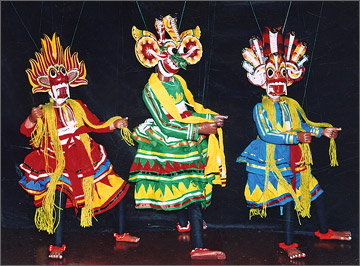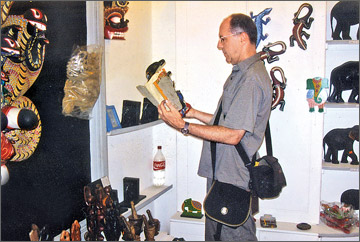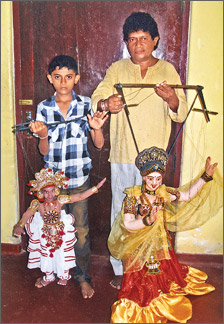Is the mask industry extinct?
By Ananda Kannangara

Mask dancers in action |

A tourist buying masks at the Ariyapala Industry |
The late British civil servant and former Assistant Government Agent
of Hambantota Leonard Woolf who was in Sri Lanka during colonial rule,
once said our country has a valuable history of 2500 years and it is the
duty of the people to protect its culture and heritage.
Leonard Woolf briefly mentioned about the Lankan heritage in his book
`Village in the jungle'. During his leisure, he walked the jungles for
hours and talked to villagers.
Once while travelling to the ancient city of Colombo, all the way
from Hambantota on a directive of an official in Colombo he had to stop
at Ambalangoda to have a little break. During his brief stay, he had the
opportunity to speak a few words with some villagers who were very
conversant with the language.
Leonard Woolf was accompanied by these villagers to several places
where traditional craftsmen were engaged in the mask and puppet
manufacturing industry. Some workers were making masks, while others
were painting them.
This was a novel experience far this British civil servant. Although
he had visited places in Hambantota where fishermen were engaged in the
fishing industry, this was the first time he had an opportunity to see
the traditional craftsmanship of Sri Lankans. He was overwhelmed by what
he saw.
Now masks are mainly used by the people in thovils, and yakun natuma
or devil dance rituals. It is a carefully crafted ritual reaching as far
back as the pre Buddhist era.
Masked dance rituals of the southern coast provides a rich and
fascinating study. For the collector these ritual masks represent a
sophisticated folk art form. Carved out of wood, these masks are
pigmented with different hues and resins and infused with a spirit that
demands attention.
The Sunday Observer visited several villages in Ambalangoda to see
the development of the traditional mask manufacturing and the puppet
industry.
The owner of Ariyapala masks manufactory in Ambalangoda, Rukman
Wijesuriya related the history of mask manufacture in Sri Lanka and said
the mask-making industry begun by his great grandfather Edoris de Silva
in Ambalangoda. He lived during the colonial period between 1798 and
1868.
"After the death of Edoris de Silva, the business was taken over by
my father Ariyapala de Silva who was born in 1901. He developed the
business to a great extent and both locals and foreigners were delighted
with the numerous shapes of masks, manufactured by our craftsmen."
He said even today, a large number of foreign nationals stop here on
their way Down South and purchase masks.
|

Nalin Gamvary performing a puppet dance with his son |
"We have a mask museum and locals and foreigners will never miss
visiting the museum while passing this way."
Manager, Ariyapala Masks Industry, U.L. Gunaratne said over 500 masks
are generally sold a month, and this number exceeds during the tourists
season between November to January.
He said the Government support is badly needed to expand the mask
industry and urged authorities to visit Ambalangoda and discuss problems
relating to the business and find out the shortcomings.
According to Gunaratne, good quality masks are manufactured with `Kaduru'
timber and they could also be manufactured with low quality timber.
He said his factory makes masks only from 'Kaduru' and this is the
secret that for the business continuing for the past two centuries.
He requested authorities to allocate State lands to plant `Kaduru'
trees, unless people who engage in the industry use low quality timber
to manufacture masks.
Fifty-year old Gunadasa Perera, of Ambalangoda said he has been in
the mask manufacturing industry for the past 35 years and said that
unlike earlier, this industry will not exist unless the Government gives
a helping hand to develop it.
He proposed that Sri Lanka Tourist Board to urge tour guides to bring
tourist groups to mask manufacturing factories and sales centres, in
Ambalangoda, so that we could earn a good income from these masks.
A small-scale mask manufacturer, David Singho requested President
Mahinda Rajapaksa to visit their factories in Ambalangoda, so that he
could personally look into their grievances.
He said in addition to a few large-scale mask manufacturers in
Ambalangoda, most manufacturers are doing the business to earn the day's
living.
He requested the Government to introduce a pension scheme for mask
manufacturers to lead a happy life, because they have toiled hard.
A famous puppet manufacturer and dancer in Ambalangoda, Nalin Gamvary
who won several awards for performing puppets at various functions said
the traditional puppet industry will become a dying industry, unless the
Government extends support for the persons, engaged in the industry.
"Although this industry has a history of over 200 years, people will
give up puppet performances, because only a few people seek our services
now".
He requested Government authorities to have their performances at
State functions, so that they could earn some money for their living.
Gamvary, who won awards at the State Drama Festivals in 1996, 1998
and 2006 said he was invited to President's House to perform a puppet
show last month and he was able to present one of his creations to the
President at the function .
He said he requested the President to help them to uplift the
industry and also to grant a monthly pension to enable them to lead a
happy life.
He also requested authorities to help them to perform "Puppet shows"
at State functions, at the Bandaranaike Airport to welcome tourists,
school functions, musical shows and other functions, so that their
industry could continue.
He said he handed over a letter to the President last month
mentioning the problems, faced by puppet manufacturers and wish to have
a reply as early as possible. "I hope the President will look into our
grievances and extend a helping hand to develop this industry,"
Gamvary also said that he had performed puppet shows at least in 20
countries, including Japan, Australia, India and Taiwan.
He also said a foreign film-maker from Finland had come to Sri Lanka
a few years ago, and filmed a puppet show under water in the sea. The
name of the film was `Under water kingdom'. He said a group of 12
persons came from Finland and they filmed a two-hour show under water
and it was around 12.00 midnight.
A long-standing puppet maker Sandun Siri of Amblangoda said his
business is running at a loss, because people who are performing shows
are not buying their goods like earlier. He urged the authorities to
make arrangements to perform puppet shows at their functions , so that
it will help people who are engaged in the industry to develop it.
He also urged officials to conduct an exhibition of puppets and masks
in Colombo, so that it will showcase and develop the industry.
Pix : by - R.
Gnanadasa - Ambalangoda Group
|

